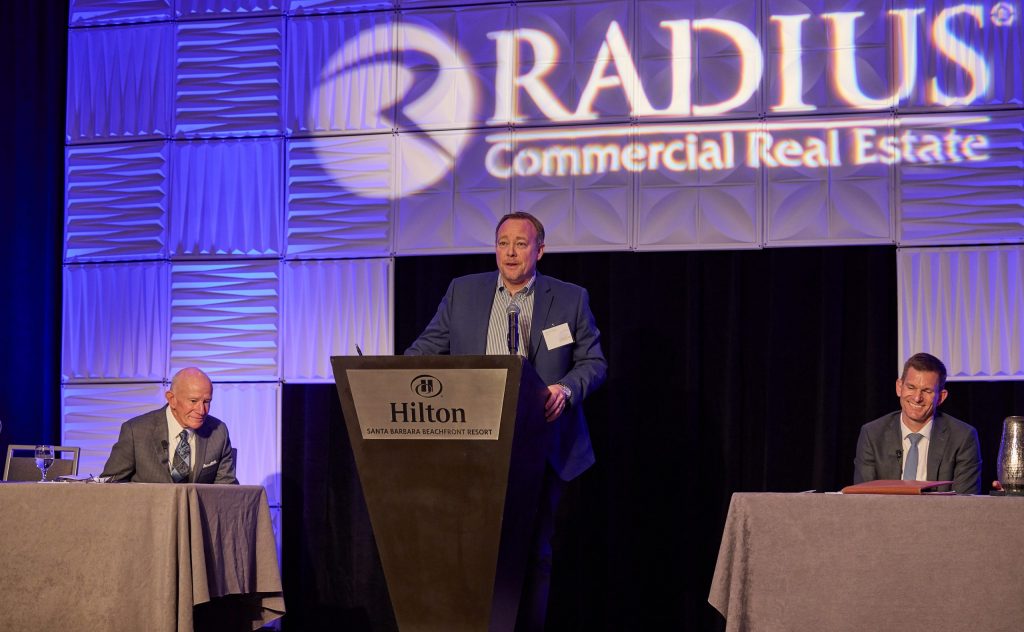Santa Barbara, California – Published 3/3/2023
Miserabilism, a synonym for gloomy, is the word for what mindset other economists have been peddling in recent months.
But Christopher Thornberg, the founder of Beacon Economics, would disagree.
He said that the real reason society has fallen into an emotional economic slump is that narrative and reality no longer agree with each other.
On Feb. 28, for the first time in four years, the Radius Real Estate and Economic Forecast took place in person and people were happy to be back, including the speakers.
Brad Frohling, one of Radius’s principal agents, joked that it was great to be together as opposed to over Zoom, but that it came at a time when he was just getting good at Zoom.
In addition to Thornberg and Frohling, speakers included Steve Golis and Gene Deering, both of Radius, with Steve Brown, also of Radius, hosting.
Thornberg says the good news about the inflation supposedly hurting our economy, is that we are actually over its peak. He predicts we can expect 8% to 11% more hiking of rates over the next two to two and a half years.
“But clearly, the worst is behind us,” said Thornberg.
Moreover, according to Thornberg, it was the second-best year ever for venture capital. But in comparison to 2021, it was a shadow. He said, in relative terms, it was 2021 that was the anomaly.
Golis voiced similar views as it pertains to the real estate market of the last couple of years, attributing the slowing of the market to the regular ebb and flow of the economy.
“I think we’ll have flat growth. Vacancy has picked up a little bit but it’s still very, very healthy… The market is still very, very strong,” he said.
Golis also praised the city and state for its stuffed pipeline of Accessory Dwelling Units (ADU) projects coming down the line.
“We just need more housing… And the cities have to loosen up, so they’re asking for information. They’re trying to see what they can do. And I’m talking about each city that I deal in, which is from Camarillo to Paso Robles,” Golis said.
Interest rate hikes make buying and building much more affordable.
Further, rates for apartment buildings are lower than home rates, so it becomes a much greater asset class for the apartment for the banks. “
And I started when the rates were at 17% to 18%. So these are bargains,” said Golis.
Frohling continued by speaking on the leasing market.
“The national vacancy rate is about 3% to 4% percent and that’s just historically low,” he said.
Frohling also explained that Santa Barbara’s industrial rate is also low but at a very healthy rate. But with the push for housing, a lot of industrial lands has been reallocated for use as potential housing.
Unfortunately, if the area does not preserve some industrial land, everything and everyone will have to come from the north or the south.
That said, offices are on their way back.
“The idea of sitting in your pajamas, petting your golden retriever and working all day is seen as not that productive and still over 50% of our national workforce has the option, which is a huge shift from working some kind of hybrid work schedule,” Frohling said.
But, footprints are shrinking and the market for offices has shed a lot of space.
Frohling said there’s an estimated $40 billion in debt coming due by the end of 2024 for office space and that we’ll soon see a lot of headlines regarding insolvency and some big office markets.
Deering launched into a rundown of some of the heartiest sales Radius saw in the last year. While admitting that sales in the first quarter were slow as compared to the fourth quarter of last year, he also noted that interest rates have already risen and that buyers may be adjusting expectations based on this uptick.
Deering also discussed the recent rains and how the overflow in some reservoirs may influence local government’s decision to allow for increased housing permits because of resource availability.
Following a potential repeal of Goleta’s water moratorium, Sacramento will likely have to accommodate construction.
“If we have the water, we know we need the units,” said Dearing.
“Will 2023 be the year where we start to see more entitled land and give us some scale in terms of the housing that we need?”
Thornberg wrapped up his keynote speech at the end of the event by reiterating a point he has been making for the past few months — the United States is not currently in a recession.

